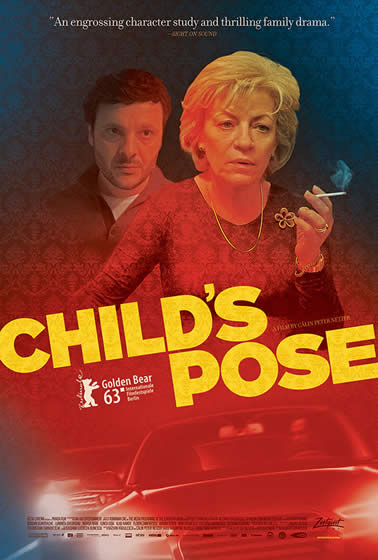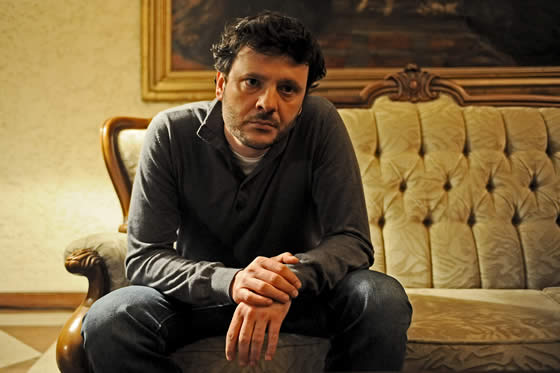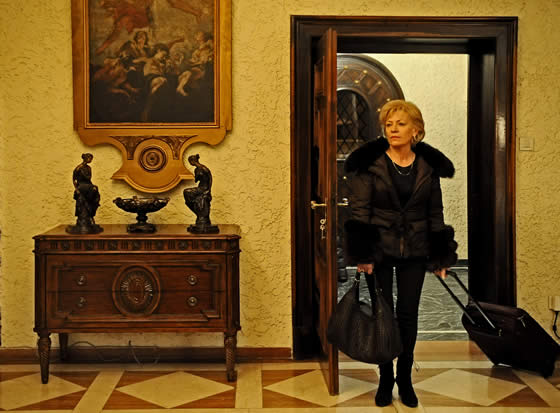 CHILD’S POSE, directed by Călin Peter Netzer is Romania’s Oscar Entry for the Best Foreign Language Film Award.
CHILD’S POSE, directed by Călin Peter Netzer is Romania’s Oscar Entry for the Best Foreign Language Film Award.
A tangled drama of ethics, corrupt authority and misplaced maternal love, CHILD’S POSE stars one of the stalwarts of Romanian cinema, Luminita Gheorghiu (THE DEATH OF MR. LAZARESCU, 4 MONTHS 3 WEEKS 2 DAYS, BEYOND THE HILLS, 12:08 BUCHAREST) as a middle-aged domineering mother and member of Romania’s ruling class, who uses all of her connections to keep her estranged adult son out of jail when he faces manslaughter charges for reckless driving.
Bijan Tehrani: How did you come up with the idea for CHILD’S POSE?
Călin Peter Netzer: I wrote the script with Razvan Radulescu. We initially had another project in mind about a dysfunctional family and we ended up talking about our families and relationships, and we finally settled on this subject because both of us have a domineering mother. So we discovered the character and that was the starting point of the screenplay.
BT: This is a very interesting story about people on the edge. It is very true-to-life in its depiction of the complicated relationship between a mother and a son. Did you have any personal experience with the subject in the film?
CPN: Yes, because the character is just like my mother, so it was not complicated. In a way it’s about her, so it was not that tough to discover the character. Also, Razvan has a domineering mother as well, so we know in a way what we are talking about.
BT: Having personal feelings about their subjects can make it difficult for directors to accurately portray them on screen, but you did it so well. How did you go about casting the CHILD’S POSE?
CPN: The casting was a long process! Initially, I had Luminita Gheorghiu in mind and many lines were written specifically for her because I knew her very well and I worked with her on my first film, but after we went to production, I casted another actresses because Luminita is very well known in Romania and I tried to find a new face—a fresher face, you know. After a few weeks of casting, however, I realized that Luminita is far and away the best option and that is about it. The rest of the cast, some of them I knew and some of them were chosen through standard auditions. 
BT: There is something also about the style of the film; the camera is almost like an eyewitness—like someone is shooting a personal video, not the typical shots of a dramatic feature. How did you come up with the visual style of the film?
CPN: First of all, I’ve mentioned that the subject is very close to me, so the film was like therapy for me. Normally I am a control freak and I plan my script and storyboards carefully before shooting—this was an exercise in a way to lose control, so I asked the DP and the cameraman together and we all got involved in the action of shooting it from their point of view. So, that happened for the first take and after that I was looking at the video system and, though I made some corrections, I wanted to lose a little bit of control and I wanted to involve the other artistic crew members in the story, so that is why we shot like this. It was also a small budget and we only had 30 days to shoot. We decided to shoot on digital with two cameras and we had to move very quickly, so that was another point for this decision.
BT: In the last decade, Romanian cinema has been coming out with so many ideas that present fresh viewpoints and films that are very honest and open with the audience. What do you think are the chances of your film receiving a nomination and possibly winning an Academy Award for Best Foreign Language Film?
CPN: I don’t know, it’s a tough year, Romania has never been nominated for an Oscar—I think only one film actually made the shortlist. Many people told me that the film has a slight chance of being nominated because of the story that is being told; it is more universal than the other Romanian films, so maybe the subject is closer to the audience here and to the Academy members, but this year there are some really good films and the competition is great so there is no favorite. I really don’t know, but I hope that the film will get shortlisted and afterwards will be nominated.
BT: Your film deals with tragedy in life while dealing with personal matters and relationships at the same time. You’ve said that the portrayal of the mother-son  relationship was based on actual experiences; what about the tragedy in the film, what was your inspiration for that?
relationship was based on actual experiences; what about the tragedy in the film, what was your inspiration for that?
CPN: This one was based on material that we saw on TV. This has happened in Romania, so we got the story into the screenplay as a fictional element, if you will. We were inspired by stories on the news and the newspaper for details in our script.
BT: Has making this film benefited you in your personal life in any way?
CPN: That is a good question because the film is like a catharsis. If you make a film and you publish a personal story about your relationship with your mother and you make it public, it is not easy. It is quite difficult, actually, and I think the effects it has had on my personal life will take a long time to become evident, it is not something that will show so soon. It is almost like therapy for me.
BT: I believe that your film will help people have a better understanding of their relationships.
CPN: Yes, because my film is posing questions. Hopefully it will help!
BT: Do you have any upcoming projects?
CPN: I hope I will work soon because since February I have been traveling to festivals and hoping to promote the film for the release. Now I am in L.A. doing this little campaign for the Oscars and I hope that by the end of the year or by the beginning of next year, I can find my peace in a way and sit down and start working on my new project.

